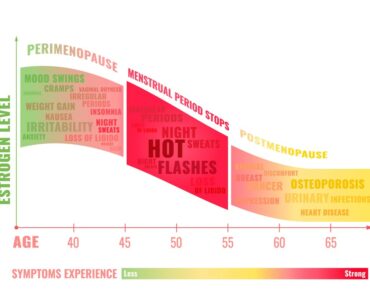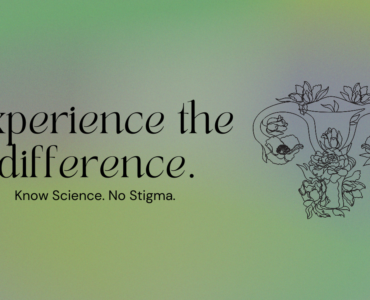
The arrival of menopause is a critical stage in a woman’s life. Many of us go through a transition filled with significant challenges for physical and mental health. The point is that you rarely cross the bridge between one stage and another without realizing it.
My own experience led me to seek information and learn about the factors that make some feel miserable while reaching menopause.
By the time I learned, I could no longer prevent many of my symptoms; however, I had found a way to enjoy this new chapter of my life with more energy and ready for a better version of myself in the short term. In this article, I want to share my ten tips for a better life after menopause.
A better life after menopause is possible.
First thing: don’t worry about risk factors you can’t control (e.g., age, heredity); instead, focus your efforts on the things you can do to help you feel the solid and healthy second half of your life.
Risk reduction has a lot in common with the one-stop shop: You can reduce the risk of many major degenerative diseases right away by following this article’s advice.
1. Avoid cigarettes. If you smoke, stop it. You can do some things that will give you immediate and lasting benefits, like quitting smoking. In 20 minutes, your heart rate will drop. The next day, you will have removed the excess carbon monoxide from your blood. In a few months, you will breathe easier and cough much less. Over the years, the risk of lung cancer, stroke, and heart disease will drop by at least half. And in 15 years, you will have eliminated your excess risk of heart disease. Also, separate yourself from smokers. Long-term exposure to second-hand smoke is weaker but still noticeable.
2. Keep moving. Lack of physical activity is an independent risk factor for nearly all diseases that are most likely to kill or disable you. Regular moderate exercise can protect you against the following problems: Heart disease and stroke, infectious diseases, dementia, and cancer.
3. Adopt a healthy eating pattern. For all the attention that has been devoted to the health benefits of “superfoods,” nutritionists now emphasize that what really counts is not eating certain healthful foods from time to time, but having a healthy dietary pattern that you adhere to most of the time, day in, day out.
4. Be mindful of your body mass index (BMI). Excess body weight increases the risk of more than 50 different health problems. These conditions include some of the leading causes of death among women: heart disease, stroke, breast cancer, and type 2 diabetes, as well as less severe conditions like arthritic knees and gallstones.
The (BMI) uses your weight and height to measure whether you are average weight, overweight, or obese.
The fat distribution also influences health risks. One of the biggest problems that occur in menopausal age is the accumulation of fat around the abdomen. While the fat accumulates in the lower body is deposited directly under the skin, the fat in the gut is largely visceral. It acts as a filler between the organs. The problem with visceral fat is that it is metabolically active and produces substances that stimulate inflammation and increase insulin resistance.
Therefore, a waist measurement of 35 inches or more puts a woman at higher risk for heart disease and type 2 diabetes.
 5. Learn to toast just once! We all toast good health for a good reason. I’m sure you’ve heard that moderate alcohol consumption has been associated with a reduced risk of heart disease and death from all causes. But for us, the benefits of alcohol disappear with a second drink. With more than one drink a day, you increase your risk of breast, head and neck, and digestive system cancer, hypertension, career, and of course, car accidents, at higher levels of intake, the risk of pancreatic and liver disease, and neurological disorders increases.
5. Learn to toast just once! We all toast good health for a good reason. I’m sure you’ve heard that moderate alcohol consumption has been associated with a reduced risk of heart disease and death from all causes. But for us, the benefits of alcohol disappear with a second drink. With more than one drink a day, you increase your risk of breast, head and neck, and digestive system cancer, hypertension, career, and of course, car accidents, at higher levels of intake, the risk of pancreatic and liver disease, and neurological disorders increases.
Women are more sensitive to alcohol than men because our bodies produce less of an enzyme that breaks down alcohol in the stomach before being absorbed into the blood. Furthermore, a woman’s body has a lower proportion of water (which dilutes alcohol) than fat (which retains it).
Also, alcohol’s effects become more insidious as women age because the body’s water-to-fat ratio decreases over the years. Even though you may be drinking the same amount of alcohol as younger, each drink has a bigger impact.
Women may be more likely than men to develop alcohol-related problems wrongly attributed to aging, such as depression, sleep disorders, poor diet, heart failure, and frequent falls. Women over 65 are also more likely than men to use medications for anxiety and depression, potentially interacting with alcohol.
6. Beware of sleep debt. The average adult should sleep seven to nine hours a day for optimal health and performance. But more than 60% of women do not reach that goal. In some cases, lack of sleep results from insomnia or other underlying conditions- But most women who develop sleep problems, manifested at both ends, consistently failing to get to bed on time or stay there for too long. It’s not hard to understand why this happens. Usually, they are caring for their young children, and, to that, menopause adds its charge.
7. Don’t take your eyes off your health. After we reach middle age, it is of the utmost importance that we ally with our healthcare providers. If you can include an experienced coach to guide you through this stage, you will be investing in your long-term health. Worry about your health, and pay attention to your body. Knowing how to recognize the signs of possible damage is very important. Please note that problems may arise years before they manifest their severe consequences.
8. Strengthen your bonds. Loneliness is a catalyst for health issues. When we reach middle age, our children leave home, and most of us say goodbye to our loved ones. Added to this are menopause and physical health problems.
Isolation is a difficult passage to cross if you have not established ties with your community; if you have not found an activity in which you can concentrate your mind. Informal socializing with friends is of particular importance. Numerous studies have charted the positive influence of social networks on health later in life.
9. Crush stress! We all face stress in daily life. Whether for a death in the family, the pain of arthritis, or a demanding job, effects on the body are the same: our body respon ds with a cascade of chemicals and hormones that speed the heart rate and breathing, increase blood pressure and the amount of energy (in the form of blood sugar) supplied to the muscles. That is what we know as the stress response. When this response is triggered too often, it becomes harmful to our health. The challenge is to keep healthy levels of stress.
ds with a cascade of chemicals and hormones that speed the heart rate and breathing, increase blood pressure and the amount of energy (in the form of blood sugar) supplied to the muscles. That is what we know as the stress response. When this response is triggered too often, it becomes harmful to our health. The challenge is to keep healthy levels of stress.
10. Practice meditation. Meditation will always help you change your perspective about the problems you are facing with menopause because it:
- is a simple activity that enables you to improve your emotional state;
- is an effective remedy against stress and anxiety.
- helps you better accommodate your social resilience skills.
- has an unlimited impact on your physical and mental well-being.
Conclusion
We all inevitably go through menopause; however, it is entirely possible to enjoy a great life after menopause. I have seen hundreds of women regain their energy and recover a hold of their lives with proper coaching guidance.






I read through these tips one by one, because these are issues that I am working on at 67. I exercise doing strength training, stretching and cardio, not because I love exercising but because I need to, and I like how i feel when i stick to the program. I am very careful about my food, but I think I could eat less carbs. Yes. Meditation has really calmed me down and I am quite consistent with it. I need to work on my BMI to reduce some inches in my belly, and I am trying to get enough sleep consistently. Thank you for the checklist. Good information
Hey JJ, thank you for reading my article. Everything you are doing is excellent for your health, and I am sure your energy and vitality are fantastic. It’s a good idea to cut back on carbs; however, I recommend that you review your alternatives. I’d love to help you a little more. I am at your disposal; you can send me a private message.
Although I am not in this stage in my life I do have a friend – whose been like a mother figure to me – that has been going through menopause. Lately, she’s been stress eating a lot and barely takes care of her health which has been a alarming factor for me and her son. I’m so glad I came across this article because even thought she is going through this, there are some things I know she can apply and change in her life to have an overall better healthy lifestyle.
Hey, Stephanie! Thank you for your comment. I am delighted that my article helped you understand more about what happens when we reach middle age. Please share this article with your friend, and let her know that she is not alone. Our children, family, and friends’ compassion and support play a crucial role in meeting this challenge.